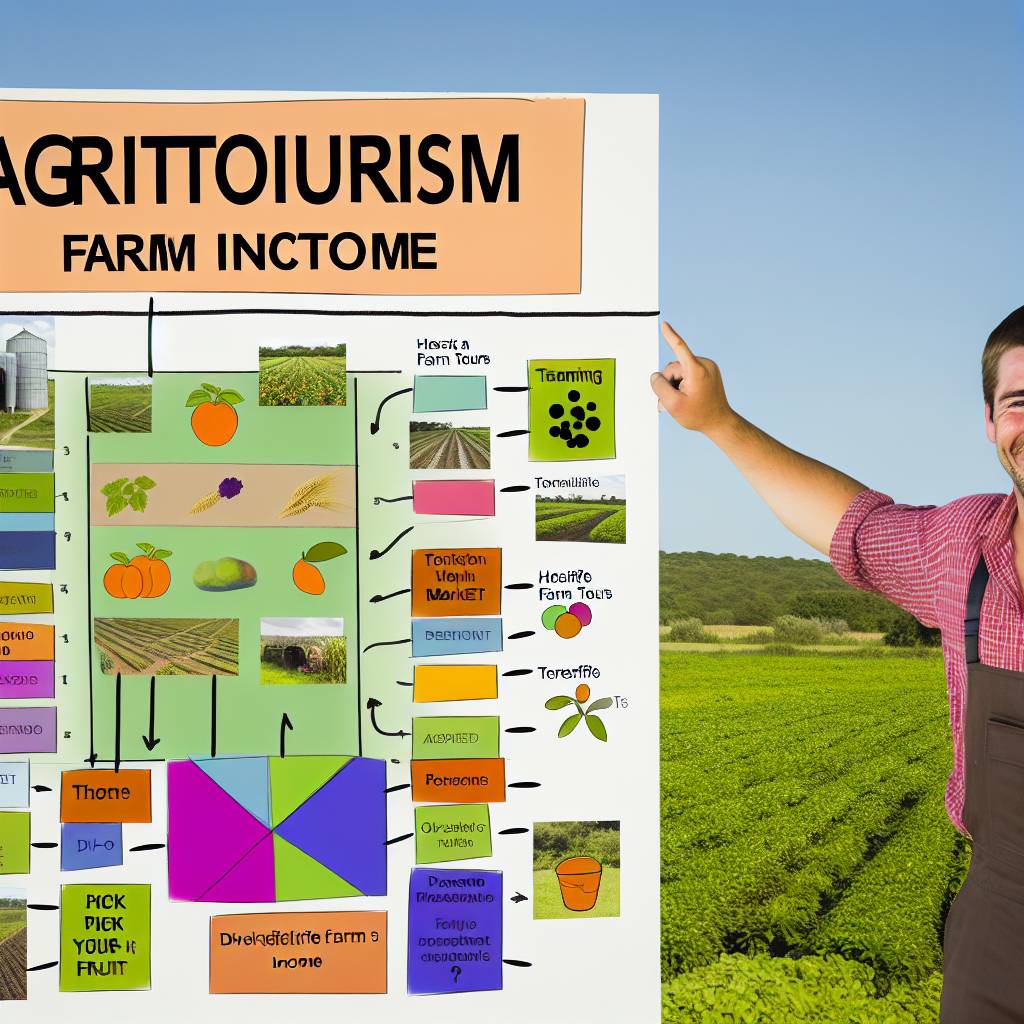Introduction to Agritourism and Its Benefits for Farmers
Agritourism combines agriculture with tourism.
This approach attracts visitors to farms and ranches.
Farmers can diversify their income through agritourism.
It provides opportunities beyond traditional crop and livestock sales.
Additionally, agritourism encourages local engagement.
Farmers can build connections with their communities.
Understanding Agritourism
Agritourism includes various activities on farms.
Examples range from farm tours to educational workshops.
Visitors learn about farming practices and local history.
This experience promotes appreciation for agriculture.
Moreover, agritourism can enhance a farm’s visibility.
Financial Benefits of Agritourism
One significant advantage is the additional revenue stream.
Farmers can charge for tours, accommodation, or events.
This income helps offset unpredictable farming costs.
Furthermore, agritourism can lead to increased product sales.
Transform Your Agribusiness
Unlock your farm's potential with expert advice tailored to your needs. Get actionable steps that drive real results.
Get StartedVisitors often purchase farm products directly on-site.
Enhancing Farm Resilience
Agritourism can boost a farm’s resilience to market fluctuations.
By diversifying income sources, farmers reduce risk.
This stability is crucial during challenging farming seasons.
Additionally, agritourism fosters innovation in farm operations.
Farmers can explore new ideas and experiences for visitors.
Cultural and Educational Impact
Agritourism also serves an educational purpose.
It offers insights into sustainable agriculture practices.
Visitors learn about food systems and environmental stewardship.
This awareness can lead to stronger community support.
Consequently, local food initiatives may gain momentum.
Creating Memorable Experiences
Farmers can design unique experiences for visitors.
Offering hands-on activities enhances engagement.
Visitors may enjoy fruit-picking, cooking classes, or crafting.
Such experiences create lasting memories and connections.
Additionally, sharing farm stories adds a personal touch.
Assessing Your Farm’s Unique Features for Agritourism Opportunities
Identifying Unique Selling Points
Your farm has distinct characteristics that can attract visitors.
Consider features like local produce, scenic landscapes, and facilities.
Highlight any historic buildings or unique livestock on your property.
These elements can serve as your farm’s unique selling points.
Conducting a SWOT Analysis
A SWOT analysis helps clarify your farm’s strengths and weaknesses.
Evaluate external opportunities and threats that may affect agritourism.
Identify your strengths, such as experienced staff or premium products.
Also, recognize weaknesses like limited marketing skills or resources.
Showcase Your Farming Business
Publish your professional farming services profile on our blog for a one-time fee of $200 and reach a dedicated audience of farmers and agribusiness owners.
Publish Your ProfileExternal opportunities may include local tourism trends or events.
Assess potential threats, such as economic fluctuations or competition.
Engaging with the Local Community
Building relationships with local businesses enhances your agritourism potential.
Collaborate with nearby restaurants, shops, and art galleries.
Participate in local farmer’s markets to increase visibility.
Encouraging community support can attract more visitors to your farm.
Understanding Your Target Audience
Define who your ideal agritourism visitor is.
Consider demographics like age, interests, and location.
Identify what experiences they seek, such as educational tours or family activities.
This information aids in tailoring your offerings to meet their needs.
Assessing Seasonal Opportunities
Different seasons provide unique agritourism opportunities.
Spring may attract visitors for farm tours and planting activities.
Summer can offer berry-picking or farm-fresh produce events.
In autumn, host hayrides and pumpkin picking for families.
Winter might allow for holiday festivities or winter markets.
Utilizing Technology for Promotion
Effective marketing is key to attracting visitors to your farm.
Create a user-friendly website showcasing your activities and offerings.
Utilize social media platforms to engage with potential visitors.
Consider email newsletters to keep interested parties informed.
Developing a Comprehensive Agritourism Business Plan
Understanding Agritourism
Agritourism combines agriculture and tourism effectively.
This approach allows farms to diversify their income streams.
Farmers can showcase their operations while educating visitors.
It also enhances the customer experience by connecting them to the land.
Identifying Target Markets
Understanding your target audience is essential for success.
Consider local residents, school groups, and urban visitors.
Each group has unique interests and needs.
Conduct surveys to determine what potential customers seek.
Creating Unique Experiences
Develop activities that set your farm apart from others.
Offer interactive experiences such as farm tours and workshops.
Include seasonal events that attract visitors throughout the year.
Promote farm-to-table dining experiences that showcase local produce.
Marketing and Promotion Strategies
Implement effective marketing strategies to reach your audience.
Utilize social media to share updates and events.
Create an engaging website that highlights your offerings.
Collaborate with local tourism boards for additional promotion.
Financial Planning and Budgeting
A clear financial plan is crucial for profitability.
Estimate startup costs for infrastructure and marketing.
Determine operational costs to sustain your agritourism activities.
Consider potential revenue streams from various activities.
Compliance and Regulations
Research local regulations regarding agritourism operations.
Showcase Your Farming Business
Publish your professional farming services profile on our blog for a one-time fee of $200 and reach a dedicated audience of farmers and agribusiness owners.
Publish Your ProfileUnderstand zoning laws, permits, and licenses required.
Ensure compliance with health and safety standards.
Assess insurance needs to protect your business and visitors.
Assessing Risks and Challenges
Identify potential risks that could impact your agritourism business.
Consider economic fluctuations and weather-related impacts.
Develop contingency plans to address unexpected challenges.
Maintain flexibility to adapt to changing circumstances.
Evaluating and Measuring Success
Establish clear metrics to evaluate your agritourism initiatives.
Monitor visitor numbers and feedback to refine offerings.
Regularly review financial performance to assess profitability.
Solicit guest reviews to improve customer experiences continuously.
Gain More Insights: Innovative Irrigation Techniques For Water Conservation
Marketing Strategies for Attracting Agritourism Visitors
Utilizing Social Media Platforms
Social media platforms play a crucial role in reaching potential visitors.
Create engaging content that highlights farm activities and events.
Use visually appealing images and videos to draw attention.
Engage with followers through polls and Q&A sessions.
Utilize specific hashtags to expand the audience’s reach.
Creating Compelling Packages and Offers
Design special packages tailored for different visitor demographics.
Consider family-friendly options that include activities for kids.
Incorporate seasonal offers to attract visitors during peak times.
Collaborate with local businesses to create joint promotional packages.
Ensure that these offerings reflect the unique features of your farm.
Building a User-Friendly Website
Your website should serve as an informative hub for agritourism visitors.
Include detailed information about events, activities, and prices.
Optimize the site for mobile devices to reach a broader audience.
Incorporate an easy-to-use booking system for visitors.
Regularly update content to keep it fresh and engaging.
Leveraging Email Marketing
Email marketing remains an effective strategy for reaching past visitors.
Collect email addresses through your website and during events.
Send out regular newsletters featuring new activities and promotions.
Personalize emails to create a more engaging experience for recipients.
Incorporate calls-to-action to encourage visitors to book their trips.
Collaborating with Local Tourism Boards
Partnering with local tourism boards can enhance visibility.
Participate in regional tourism events to promote your agritourism offerings.
Develop relationships with local hotels and restaurants for cross-promotion.
Leverage brochures and promotional materials distributed by tourism boards.
Ensure your farm is included in local tourism websites and guidebooks.
Gain More Insights: Reducing Transportation Costs In Agribusiness
Creating Engaging On-Site Experiences
Farm Tours
Farm tours offer a unique way to connect with visitors.
They allow guests to learn about farming practices.
Showcase Your Farming Business
Publish your professional farming services profile on our blog for a one-time fee of $200 and reach a dedicated audience of farmers and agribusiness owners.
Publish Your ProfileGuided tours can showcase both crops and animals.
Additionally, consider incorporating storytelling about your farm.
This could include your family history or sustainable practices.
Engaging visitors with hands-on activities can enhance their experience.
For instance, let them pick fruits or vegetables.
Safety measures should ensure a secure environment for everyone.
Workshops
Workshops can provide valuable learning opportunities.
Customers might enjoy classes on preserving produce or making cheese.
These sessions can focus on skills applicable to home settings.
Consider hosting seasonal workshops to attract repeat visitors.
Cater the content to different age groups to maximize participation.
Promote workshops through social media and local advertising.
This can build interest and awareness of your offerings.
Special Events
Holding special events can draw crowds to your farm.
Harvest festivals and holiday events encourage community engagement.
These gatherings can feature local artisans, music, and food.
Encourage local vendors to showcase their products for added variety.
Additionally, consider offering farm-to-table dinners.
These events not only showcase your produce but also support local chefs.
Promote these special events well in advance to maximize attendance.
Learn More: Enhancing Inventory Management for Online Farming
Understanding Legal Considerations and Regulations for Agritourism
Overview of Agritourism Regulations
Agritourism encompasses a variety of activities on farms that engage the public.
These activities vary widely, including farm tours, pumpkin patches, and farm-to-table events.
In many regions, specific regulations govern these practices.
Farmers must understand local laws before starting agritourism ventures.
Permits and Licensing
Obtaining the proper permits is essential for agritourism operations.
Local authorities may require specific licenses for food service or recreational activities.
Additionally, health and safety regulations often apply.
Farmers should consult with local government offices for guidance.
Liability and Insurance
Liability is a critical concern for agritourism operators.
Accidents can happen on farms, so having adequate insurance is vital.
Liability insurance can protect against potential lawsuits and claims.
Farmers should also consider waivers for visitors participating in hazardous activities.
Zoning Laws
Zoning laws impact where agritourism activities can occur.
Restrictions vary by municipality, affecting the types of operations permitted.
Farmers need to verify zoning regulations related to agritourism.
Engaging with local zoning boards can clarify permissible uses of land.
Health and Safety Regulations
Health and safety regulations are crucial when hosting visitors.
Farmers must ensure facilities are safe and accessible for guests.
This includes maintaining clean restrooms and providing safe pathways.
Showcase Your Farming Business
Publish your professional farming services profile on our blog for a one-time fee of $200 and reach a dedicated audience of farmers and agribusiness owners.
Publish Your ProfileRegular inspections can help identify potential hazards.
Environmental Regulations
Environmental regulations may also impact agritourism activities.
Farm operations must comply with laws protecting local ecosystems.
This includes waste management and preservation of natural resources.
Understanding these regulations enhances sustainability in agritourism.
You Might Also Like: Waste Reduction Methods In Farming Operations

Utilizing Technology to Enhance Agritourism Experiences
Integrating Online Booking Systems
Using online booking systems streamlines the reservation process for visitors.
These platforms provide instant confirmation and easy access to information.
Additionally, they help farmers manage schedules efficiently.
Customers appreciate the convenience of online booking.
This integration can increase overall visitor satisfaction.
Enhancing Engagement Through Social Media
Social media offers farmers a platform to showcase their experiences.
Sharing engaging content attracts a larger audience to agritourism sites.
Farmers can share photos, stories, and events to captivate visitors.
Effective use of hashtags can broaden reach on platforms like Instagram.
Moreover, engaging with audiences fosters community relationships.
Leveraging Virtual Tours
Virtual tours provide potential visitors a sneak peek of attractions.
This technology allows users to explore the farm from home.
Interactive elements can enhance the virtual experience.
Virtual tours can help drive interest and potential visits.
They also serve as an innovative marketing tool for farms.
Implementing Mobile Applications
Mobile applications can enrich the visitor experience on-site.
These apps can offer self-guided tours with audio explanations.
Users can receive notifications about upcoming events or specials.
Moreover, interactive maps guide visitors to attractions easily.
Overall, apps can enhance engagement and provide valuable information.
Utilizing Data Analytics for Improvement
Data analytics allows farmers to understand visitor behaviors better.
Analyzing trends can inform effective marketing strategies.
Understanding demographics helps tailor experiences to specific audiences.
Moreover, this information can guide resource allocation on the farm.
Data-driven decisions lead to improved agritourism profitability.
Success Stories: Case Studies of Farms Thriving Through Agritourism
Sunny Meadows Farm
Sunny Meadows Farm has embraced agritourism with great success.
Located in Oregon, this family-owned farm offers a variety of experiences.
Visitors can enjoy pumpkin picking in the fall and berry picking in the summer.
These activities attract families looking for outdoor fun.
Moreover, the farm hosts seasonal events that draw large crowds.
For instance, their annual Harvest Festival features live music and local artisans.
This diversification has significantly boosted their income.
Sunny Meadows Farm has successfully created a loyal customer base.
Riverbend Vineyards
Riverbend Vineyards is a notable example in the wine industry.
Showcase Your Farming Business
Publish your professional farming services profile on our blog for a one-time fee of $200 and reach a dedicated audience of farmers and agribusiness owners.
Publish Your ProfileLocated in California, this vineyard combines wine tasting with educational tours.
Visitors learn about viticulture and the wine-making process.
These tours include tastings of their finest wines.
Additionally, the vineyard hosts special events like wine-pairing dinners.
These experiences enhance their brand and attract new customers.
As a result, Riverbend Vineyards has seen a surge in sales.
The vineyard attributes this success to their engaging agritourism initiatives.
Cloverfield Farms
Cloverfield Farms in Vermont offers a unique farm-to-table experience.
This farm hosts cooking classes using fresh, seasonal produce.
Participants gain hands-on experience while learning about sustainable practices.
The farm also provides guided tours showcasing their sustainable methods.
Due to these initiatives, Cloverfield Farms has become a local favorite.
Furthermore, they partner with local chefs for special dining events.
This collaboration helps promote local food culture and community support.
Consequently, Cloverfield Farms has diversified its income streams successfully.
Green Acres Petting Zoo
Green Acres Petting Zoo illustrates how agritourism can blend education and fun.
Located in Texas, this petting zoo offers interactive experiences for children.
Kids can feed animals and learn about farm life in an engaging way.
Additionally, the zoo hosts birthday parties and school field trips.
These events help generate consistent revenue throughout the year.
Moreover, educational programs focus on animal care and environmental awareness.
This combination of fun and learning attracts a diverse audience.
Overall, Green Acres Petting Zoo highlights the potential in agritourism.
Measuring Success: Key Performance Indicators for Agritourism Ventures
Defining Key Performance Indicators
Key Performance Indicators (KPIs) are vital for agritourism success.
These metrics help you measure the effectiveness of your strategies.
By analyzing KPIs, you can make informed business decisions.
Common Key Performance Indicators
Several KPIs can be useful for agritourism businesses.
- Revenue generated from agritourism activities.
- Visitor numbers during peak and off-peak times.
- Customer satisfaction ratings from surveys.
- Repeat visit rates among patrons.
- Social media engagement and followership growth.
Evaluating Financial Performance
Financial KPIs provide insight into your profitability.
Measure gross revenue to understand overall income.
Analyze net profit margin after expenses for clarity.
Additionally, evaluate cash flow to ensure liquidity.
Assessing Visitor Engagement
Visitor engagement plays a crucial role in agritourism success.
Track attendance figures to identify trends and patterns.
Monitor feedback scores to maintain high satisfaction rates.
Regularly assess the effectiveness of marketing efforts.
Utilizing Customer Feedback
Customer feedback is essential for continuous improvement.
Conduct surveys and gather testimonials from visitors.
Analyze responses to identify strengths and weaknesses.
This feedback guides future offerings and enhancements.
Leveraging Social Media Metrics
Social media metrics offer valuable insights into engagement.
Showcase Your Farming Business
Publish your professional farming services profile on our blog for a one-time fee of $200 and reach a dedicated audience of farmers and agribusiness owners.
Publish Your ProfileTrack likes, shares, and comments to gauge interest.
Analyze the reach of your posts to enhance visibility.
Use these insights to fine-tune your marketing strategies.
Benchmarking Against Competitors
Benchmarking against competitors is a useful practice.
Identify industry standards to evaluate your performance.
Analyze what successful competitors are doing differently.
Use this information to stay competitive and innovative.
Creating Regular Reports
Regular reports help visualize your progress.
Develop a reporting framework to track KPIs consistently.
Include graphical representations for easier interpretation.
Review these reports quarterly to assess growth.
Sustainable Practices in Agritourism: Balancing Income with Environmental Responsibility
Understanding Sustainable Agritourism
Sustainable agritourism embraces practices that benefit both farmers and the environment.
This approach attracts visitors while preserving natural resources.
Moreover, it promotes responsible land management and environmental stewardship.
Benefits of Sustainable Practices
Implementing sustainable practices leads to multiple advantages.
- Increased visitor satisfaction through beautiful landscapes.
- Improved farm resilience against climate change impacts.
- Enhanced local ecosystems by supporting biodiversity.
In addition, these practices often lead to positive community engagement.
Key Sustainable Strategies
Several effective strategies ensure successful agritourism while protecting the environment.
- Practice organic farming to reduce chemical inputs.
- Implement water conservation techniques to minimize waste.
- Use renewable energy sources to power facilities.
Additionally, promoting local wildlife habitat conservation is essential.
Collaborative Efforts and Community Involvement
Collaboration with local organizations can amplify sustainable efforts.
Farmers can partner with conservation groups to create educational programs.
Such initiatives foster community awareness about environmental issues.
Furthermore, engaging visitors in sustainability practices enhances their experience.
Measuring Sustainability Success
Evaluating sustainability practices is crucial for ongoing improvement.
Farmers should track resource usage and visitor feedback regularly.
Moreover, setting specific sustainability goals can guide progress.
Through consistent evaluation, farmers can adapt strategies for better outcomes.
Additional Resources
FARM DIVERSIFICATION THROUGH AGRI‐TOURISM
Competitiveness of diversification strategies in agricultural dairy …




